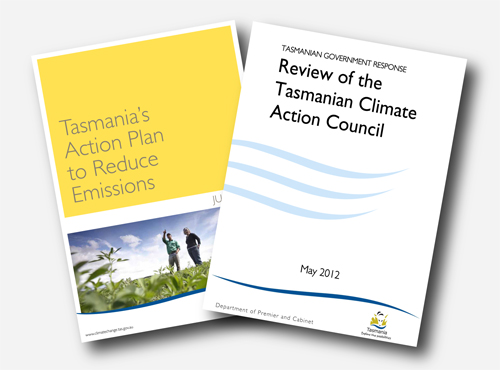Despite what the science continues to tell us, developing climate policy seems have fallen off the radar. Good news is that we now have a brand new Tasmanian Climate Action Council. [5 June 2012 | Peter Boyer]
The past three years have been a rocky road for climate policy.
The failure of the 2009 Copenhagen summit and the ballyhoo over claims (now discredited) of scientific fraud saw a wavering of global public support, putting pressure on administrations everywhere to slow or halt processes for climate action.
This flies in the face of current science. Far from being alarmist, recent ocean data analysis suggests that modelling of the impact of rising atmospheric carbon levels may have been far too conservative — a story I’ll return to in coming weeks.
The implications of this growing science-policy gap are discomfiting. One side of politics has made a virtue of beating your chest and loudly rejecting scientific advice, and it’s catching. Climate policy is making more than a few Labor politicians twitchy about their electoral margins.
Out in the electorate, messages remain mixed. An April Nielsen poll said that about six in ten Australians oppose a price on carbon, yet an Institute of Public Affairs poll out last week showed the same proportion of people prepared to pay to mitigate climate change. Where’s the logic in that?
We probably shouldn’t even look for logic. Some US research published last week in the online journal Nature Climate Change produced compelling evidence that public opinion about climate change can’t be blamed on a misunderstanding of the science.
The study says that people’s views on climate are shaped by conflicting sentiments: a collective wish to see good science used for good public outcomes and a personal wish that their beliefs are in line with those of people they’re close to. The personal seems now to be in the ascendancy.
With polls showing waning support for climate action, the Gillard government might have decided not to put a price on carbon emissions if the hung parliament hadn’t forced it into an agreement. It may lose the next election but it would already be history if it had reneged on that agreement.
Which brings us to our own patch. Under Paul Lennon in 2008, Tasmania established an advisory Tasmanian Climate Action Council (TCAC), set up a unit in the Premier’s Department to manage and promulgate climate actions, and legislated a target of a 60 per cent cut in emissions by 2050.
Under David Bartlett’s first government the “Wedges” report identifying Tasmanian carbon emissions was released, but no significant climate policies surfaced. Then came the 2010 election and, after a long standoff, agreement with the Greens to form a new government.
Anticipating events in Canberra a few months later, Bartlett found a way to accommodate the Greens in a minority government, and with Greens breathing down his neck was forced to allow climate a little more space than public opinion would have suggested.
Space is one thing; action is another. The TCAC responded to the Wedges report with a detailed list of options to cut emissions, and more recently offered pathways to crucial interim emissions reduction targets, but there’s been no substantial outcome from either report.
Ignoring some strong rhetorical flourishes from climate ministers Nick McKim and Cassy O’Connor, Bartlett and now Lara Giddings have shown little interest in pushing the climate policy barrow. Giddings focused instead on reining in spending, with the result that O’Connor’s “climate action plan” turned into a bit of a fizzer.
O’Connor has instigated two inquiries. One is a much-needed analysis of Tasmania’s forest carbon resource in the lead-up to carbon pricing, due to be presented by the end of June, and the other is John Ramsay’s TCAC investigation.
The Ramsay report, released in March, pointed to refinements in process to make the council more effective while commending the inaugural council for its work in “challenging” times. The government has ticked off on most of his recommendations.
The cynic in me would say that an inquiry is a government’s way of putting off doing something. I accept that both these studies were needed, and that they have value. But they’re not policy.
I’ve had some positive dealings with O’Connor as minister, as I have with members of the TCAC and staff of the Tasmanian Climate Change Office, and in all these places there’s much goodwill and commitment to the cause of mitigating climate change.
But leaving aside those directly responsible, since the brief flurry under Paul Lennon most Tasmanian MPs have shown blank indifference towards climate policy.
I know O’Connor (who’s anything but indifferent) would protest that times have been tough and that she did well to secure the action plan that she did. Given how focused Giddings has been on the bottom line I’m sure that’s true, but I’m also sure that it isn’t enough.
As she departed from the TCAC, its inaugural chair, Kate Crowley, warned of the need for all politicians and bureaucrats — and especially those in top positions — to be fully committed and effective in tackling emissions in both their own workplaces and the wider community.
This laudable aim looked possible in 2008 when the TCAC began its work. Today it seems like a fading dream.
O’Connor must somehow find a way to make progress against the tide of indifference, to win the support of a distracted premier and translate her own personal commitment into substantive policy measures. I don’t envy her.
• Professor Lesley Hughes (Macquarie University and federal Climate Commissioner) heads up the new Tasmanian Climate Action Council to be announced by Climate Change Minister Cassy O’Connor today (5 June). Other members are Jess Feehely (Deputy Chair, Tasmanian Environmental Defenders Office), Greg Johannes (Tasmanian Premiers Department), Dr James Risbey (scientist, CSIRO), Dr Thomas Moore (oceanographer), Dr Anna Lyth (strategic planner), Prof Jan McDonald (environmental law specialist), Paul Gilding (author, former head of Greenpeace), and community representatives Chris Harries (Hobart) and Nick Towle (Burnie).

